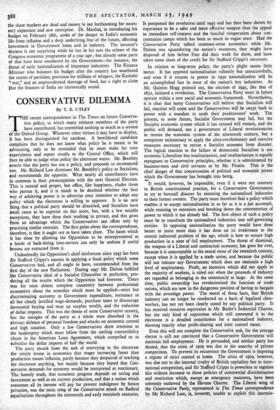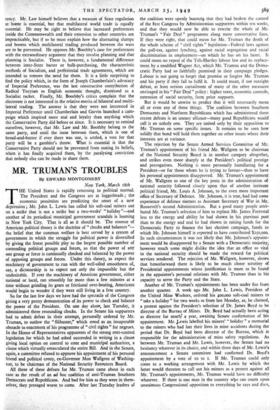CONSERVATIVE DILEMMA
By T. E. UTLEY HE recent correspondence in The Times on future Conserva- tive policy, to which many eminent members of the party have contributed, has resembled nothing so much as a session of the Oxford Group. Whatever other virtues it may have to display, it has been distinguished for candour. A bewildered candidate complains that he does not know what policy he is meant to be advocating, only to be reminded that he must make his own experiments and report results to the Central Office, which will then be able to judge what policy the electorate wants. Mr. Boothby asserts that the party has not a policy, and proceeds to recommend one. Mr. Richard Law dismisses Mr. Boothby's policy as Socialism, and recommends the opposite. What nearly all contributors have in common is their preoccupation with the next General Election. This is natural and proper, but office, like happiness, eludes those who pursue it, and it is much to be doubted whether the best way of achieving power is to advertise your intention to adopt any policy which the electorate is willing to approve. It is no new thing that a political party should be disunited, and Socialists have small cause to be superior on this score, but, with a few notable exceptions, they have done their washing in private, and this gives them an advantage which the Conservatives can offset only by practising similar restraint. The first point about the correspondence, therefore, is that it ought not to have taken place. The harm which it has done by allowing the Opposition to be misrepresented as a horde of back-biting time-servers can only be undone if useful lessons are extracted from it.
Undoubtedly the Opposition's chief misfortune since 1945 has been Sir Stafford Cripps's success in applying a fiscal policy which some Conservatives had, and all ought to have, recommended from the first day of the new Parliament. During 1947 Mr. Dalton fulfilled the Conservative ideal of a Socialist Chancellor to perfection, pro- ducing all the results which the Opposition had foreseen. There was for once almost complete unanimity between professional economists about the remedies which must be applied—strict but discriminating economy in Government expenditure, resistance to all but clearly justified wage-demands, purchase taxes to discourage inessential buying and mop up surplus wealth, and the reduction of dollar imports. This was the theme of some Conservative oratory, but the energies of the party as a whole were absorbed in the abstract defence of personal freedom and attacks on economic control and high taxation. Only a few Conservatives drew attention to the bankruptcy which must follow from the sterling convertibility clause in the American Loan Agreement, which compelled us to subsidise the dollar imports of half the world.
The party shrank from the task of conveying to the electorate the simple lesson in economics that wages increasing faster than production means inflation, partly because they despaired of teaching the electorate anything, but mainly because they feared that Con- servative demands for economy would be interpreted as reactionary. The homely truth, that economic progress depends on saving and investment as well as on current production, and that a nation which consumes all its income will pay for present indulgence by future privation, was the main sting of the Conservative attack on Radical equalitarians throughout the nineteenth and early twentieth centuries.
It postponed the revolution until 1945 and has thus been shown by experience to be a safer and more effective weapon than the appeal to immediate self-interest and the fanciful vituperation about con- centration camps which has been so much in vogue since. Had the Conservative Party talked common-sense economics while Mr. Dalton was squandering the nation's resources, they might have disposed of him before Fate did their work for them, and have taken some share of the credit for Sir Stafford Cripps's successes.
In relation to long-term policy, the party's plight seems little better. It has opposed nationalisation valiantly but unsuccessfully, and even if it returns to power in 195o nationalisation will be an accomplished fact in most of the nation's key industries. As Mr. Quintin Hogg pointed out, the election of 1945, like that of 1832, initiated a revolution. The Conservative Party must in future operate within a new social and economic framework. Nevertheless, it is clear that many Conservatives still believe that Socialism will fail, reaction will come and the Conservatives will be swept back to power with a mandate to undo their predecessors' work. The present, or some future, Socialist Government may fail, but the Socialist economic system which it has created will remain, and the public will demand, not a government of Liberal revolutionaries to restore the economic system of the nineteenth century, but a competent technocracy to apply the ultra-revolutionary and coercive measures necessary to rescue a Socialist economy from disaster. The logical reaction to the failure of democratic Socialism is not economic Liberalism but totalitarianism, and totalitarianism is equally repugnant to Conservative principles, whether it is administered by business-men and civil servants or by Mr. Piratin. This is the chief danger of that concentration of political and economic power which the Government has brought into being.
It would, however, be impossible, even if it were not contrary to British constitutional practice, for a Conservative Government to try to forestall disaster by restoring the nationalised industries to their former owners. The party must therefore find a policy which enables it to accept nationalisation in so far as it is a fait accompli, while resisting its extension and breaking down the concentration of power to which it has already led. The first object of such a policy must be to transform the nationalised industries into self-governing entities. In opposing nationalisation the party would have done better to insist more than it has done on its irrelevance to the central industrial problem of the age, which is how to ensure high production in a state of full employment. The threat of dismissal, the weapon of a Liberal and contractual economy, ha gone for ever, because it is unacceptable to the moral sense of the twentieth century, except when it is applied by a trade union, and because the public will not tolerate any Government which does not maintain a high level of employment. Profit, an incentive which did not apply to the majority of workers, is ruled out when the proceeds of industry are regarded as belonging to the community at large. At the same time, public ownership has revolutionised the function of trade unions, which are now in the dangerous position of having to bargain with the sovereign power. The moral of these facts, that British industry can no longer be conducted on a basis of legalised class- warfare, has not yet been clearly stated by any political party. It has received tentative expression in Mr. Butler's Industrial Charter, but the only kind of expression which will commend it to the electorate is a detailed constitution for a nationalised industry, showing exactly what profit-sharing and joint control mean.
Even this will not complete the Conservative task, for the average elector is still not convinced that a Conservative Government will maintain full employment. He is persuaded, and neither party has denied, that the crisis of 1929 was due to the anarchy of private competition. To prevent its recurrence the Government is imposing a regime of strict control at home. The crisis of 1929, however, was due not to the internal rivalry of British capitalists but to inter- national competition, and Sir Stafford Cripps is powerless to regulate this without -recourse to those policies of commercial discrimination and restriction which, except as emergency measures, have been solemnly outlawed by the Havana Charter. The Liberal wing of the Conservative Party, represented in The Times correspondence by Mr Richard Law, is, however, unable to exploit this inconsis- tency. Mr. Law himself believes that a measure of State regulation at home is essential, but that multilateral world trade is equally essential. He may be right to believe that increased preferences inside the Commonwealth and their extension to other countries are impracticable, but if so he must explain how the alternating slumps and booms which. multilateral trading produced between the wars are to be prevented. He opposes Mr: Boothby's case for preferences with the extraordinary argument that they involve planning and that planning is Socialist. There is, however, a fundamental difference between inter-State barter or bulk-purchasing, the characteristic methods of Socialism, and preferential trade agreements, which are intended to remove the need for them. It is a little surprising to find the policy which, in the form of Joseph Chamberlain's advocacy of Imperial Preference, was the last constructive contribution of Radical Toryism to English economic thought, dismissed as a Socialist racket. Finally, Mr. Boothby's critics complain that the electorate is not interested in the relative merits of bilateral and multi- lateral trading. The answer is that they were not interested in Imperial Preference until Chamberlain and Garvin launched a cam- paign which inspired more zeal and loyalty than anything which the Conservative Party did before or since. It is necessary to remind ourselves, however, that Mr. Law and Mr. Boothby belong to the same party, and until the issue between them, which is one of bread-and-butter if ever there was one, is settled, a vote for that party will be a gambler's throw. What is essential is that the Conservative Party should not be prevented from stating its beliefs, when it has finally acquired them, by the paralysing conviction that nobody else can be made to share them.















































 Previous page
Previous page